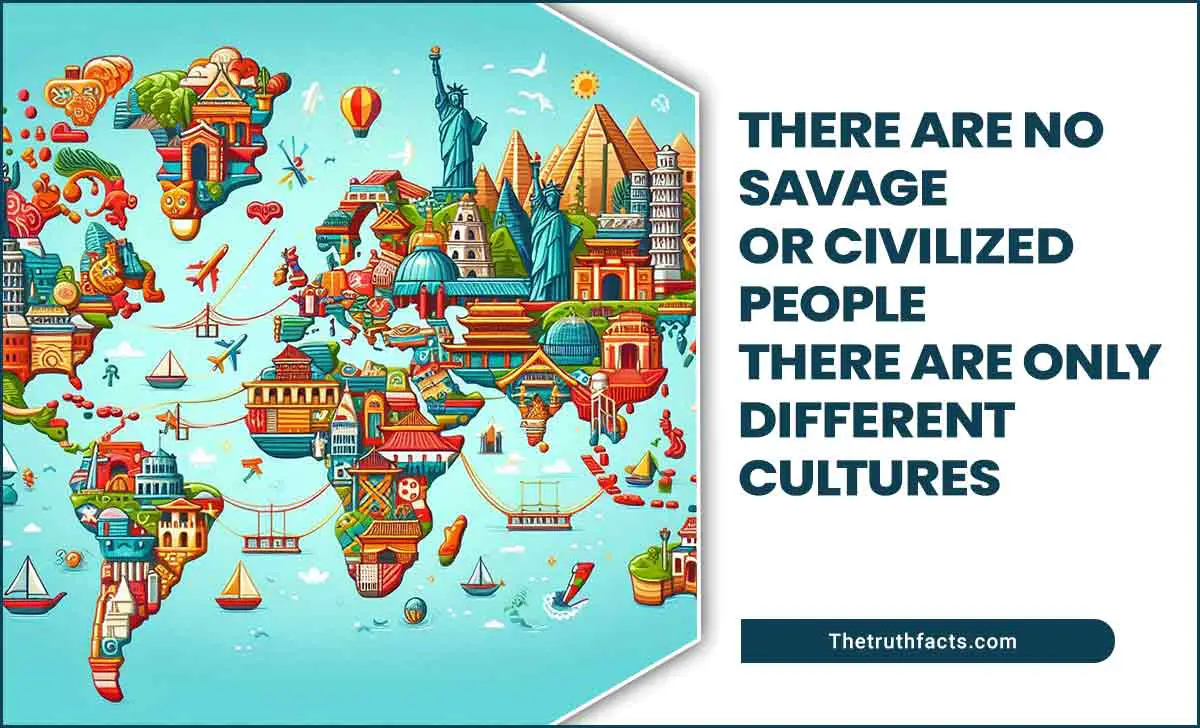Our world is the house of diversity. Alternatively, we can call variety the driving force that makes our world so lively. You cannot even find two snowflakes that look alike. Not every flower from the same tree looks identical.
Not every peach from the same branch tastes the same. Just as everything around us is different in its unique way, how can you find commonness in the being that dominates the world? Human beings are like snowflakes.
Each of them is different in their way. Yet, we like to categorize them in terms of nationality, religion, or ethnicity. We like to seek similarities. When someone is similar to us in some manners, they are one of us.
When someone is not, we categorize them into another group. Over time in history, this categorization has led human beings to talk about self and others, about superior and inferior, about civilized and savage.
But is there anything called savage or civilized? Or should we change the lenses and see differently? Today, we are pondering the topic of making debates online – There are no savage or civilized people; there are only different cultures.

There Are No Savage Or Civilized People – What World Thinks?

When the topic was raised on one online platform, 26% out of 196 respondents agreed with the statement. 31% of the respondents from New York agree with the statement.
40% of the respondents from Michigan agreed with the statement. 32% of respondents with black racial background agree with the statement. In comparison, 24% of respondents with white racial backgrounds agree with it.
While the portal above shows us how a majority of the American respondents agree with the statement, another portal shows us something different. 61% of votes cast by 52 people were on the disagree button.
These are just chunks of the larger debate that is taken place online regarding this topic. Some people strongly agree with the idea, while others are firmly opposing it. So, what is our take on it?
What Do ‘Savage’ and ‘Civilized’ Mean?

Let us find the linguistic etymology of the main words of the statement – savage and civilized. What do we understand by savage? When does someone or something become savage?
Who decides what sort of act is savage? Similarly, what is the meaning of civilized? Who decides what a civilized act is and what is barbaric?
According to Oxford Dictionaries, savage is a synonym of ‘brutal.’ When someone deals with someone or something with cruelty or violence, the act is savage. Whereas civilized stands for “well organized socially with a very developed culture and way of life.”
So, when we call any practice savage or brutal, it means that the practice is alien to our notion of ‘developed culture.’ If so, then how do we measure the brutal reality of the industrial revolution?
The 2nd industrial revolution marking the beginning of mass production, is one of the means to give us the ‘civilized way of life. But, it was achieved by constant exploitation of the working class.
Who Are The ‘Civilized’ Ones?
According to Walter Benjamin, “There is no document of civilization which is not at the same time a document of barbarism.” When you read about the great Roman civilization, you cannot help but acknowledge the barbaric acts that brought them that civilization.
Extremism can exist in the most civilized societies. Think about Germany before the world wars. It was the epitome of civilization with a rich culture and heritage.
But when the same nation showed us one of the most barbaric examples of ethnic cleansing by performing the Jewish holocaust, we consider it a bloodstain on the chuddar of civilization.
Cultural Relativism
In today’s world, where we are setting foot to the farthest corner to know the unknown, can we still stand on the ground of self-righteousness and call every ‘others’ savage? Understanding other’s beliefs, customs, and ethics is part of cultural relativism.
If we agree that no one’s culture is superior or inferior, then we can dwell with respect in this world. Think about the 19th-century colonization of the Indian subcontinent or Africa. The so-called idea of ‘civilization’ came along with the exploitation of indigenous people. The colonizers looked down upon the colonized people.
They believed in the supremacy of themselves and justified their rule by the name of ‘civilization.’ The British colonizers are known for introducing railway service in India. But this development was at the cost of 200 years of violence, money looting, trafficking of properties, and exploitation of the large Indian population.
Culture and ethics are subjective topics. Ethnocentrism is omnipresent in human beings. Unless one can truly understand the history, lifestyle, custom, and inherit the belief system of a particular society – no one can get the essence of another culture. Without resetting their socio-cultural reality, every unfamiliar topic of another culture can get the ‘savage’ title. In this notion, some people agree with the statement.
Moral Relativism
Cultural relativism cannot exist without moral relativism. If we see civilization from the lenses of human development, we may agree that some basic code of conduct is common among many cultures.
Those code-of-conducts together form the basics of human rights as we know them today. Thirty articles of UDHR are formed based on the moral relativism of nations. No one should be subjected to cultural prejudice. Then, what if someone is subjected to moral violation by their culture? How do we evaluate if it is harmless culture or not?
Custom Or Malpractice?
Take a look at Female Genital Mutilation (FGM), for instance. It is performed in many countries in Africa and Asia. The act of deliberate cutting or changing female genitals is known as FGM. This act is considered a violation of women’s human rights.
Without any strong religious or scientific explanation, this act has been carried by many cultures. Many societies can condemn traditional practices like this as these sorts of practices are perpetual to dominate one particular gender.
Positioning any human to a lesser degree should not be accepted. Customs that threaten the life of any individual is also unacceptable. If we looked back in 1829, we could see the abolishment of Satidah Pratham in India.
This custom of burning down the widow with the late husband was abolished in colonized India. In many cultures across Asia, ‘honor killing’ is seen as maintaining purity in the culture. So, if everything is “only different cultures,” then how do we point out the fault at these customs and challenge to change it? How do we condemn cultures that legalize acid throwing in the name of belief and custom? How do we stop extremists from banning women’s education?
Our Take On The Subject

In reality, there are No Savage or Civilized People; there are Only Different Cultures. Especially for human beings, the grey world seems larger than black and white. Many factors shape our thinking. No one is a-political. Everyone functions in accordance with years of social learning and accumulated assumptions and beliefs.
But we have reached the level of discussion where we must choose a side on this debate. We do not call any culture savage or civilized. We better put it on the scale of human rights. We look closer at the topic and observe. Is someone’s right to maintain culture is violating someone else’s right to liberty and life? We ask ourselves this question.
We then ask, is it the culture that performs violence? Or is it the people hiding behind sheets of customs and beliefs? How does one ‘savage’ custom violate the liberty of people? Whom does the practice serve in reality? The culture or the people?
Let us go back to the beautiful continent of Africa one last time. Remember FGM. This custom is performed to sustain female purity. The belief is that genital mutilation reduces the sexual desire of women. This belief leads over 400 million girls to go under blades every year. They are more likely to suffer from infections and maternal complications.
Callwell and Savage Warfare
Callwell and Savage Warfare is a Massachusetts-based law firm that specializes in military and veterans law. The firm was founded in 2017 by attorney Tahir Callwell, who served as a United States Marine Corps infantry officer for six years. Attorney Savage Warfare joined the firm in 2018 and is an Iraq War veteran who has experience representing servicemen and women in military justice matters.
The Callwell and Savage Warfare team has extensive experience in both civilian and military court proceedings, including combat-related claims such as habeas corpus, unlawful detention, torture, sexual assault, and death benefits. The firm also assists servicemen and women with issues such as family separation, disability compensation, education benefits, and reintegration into civilian life.
If you or a loved one has been injured or harmed while serving your country, please contact the Callwell and Savage Warfare team for a free consultation. We would be happy to discuss your legal options with you and answer any questions you may have.
Discourse Of The Dum-dum
Thank you for your question! A dum-dum is a type of projectile weapon that was used in late medieval Europe. It was typically a shaped weight, with two sharpened edges on either side of a round or egg-shaped head. The weapon was fired from a crossbow by depressing a lever that sent the weighted head flying at high speed.
A dum-dum is a type of artillery shell that uses tracer ammunition. The projectile has a small explosive charge at its nose, and a weight at the rear to keep it in flight. As it reaches the target, the charge detonates, throwing the shell forward and toward the target.
Notes And References Of Civilized People

There is no single answer to this question, as the notes and references of civilized people will vary depending on the individual’s culture, education, and experience. That said, some general points that are worth keeping in mind include:
– Taking notes during lectures, readings, or other educational material can help you to understand and remember what was covered.
– References can be used to explore topics in greater detail or to find additional sources of information.
– Keeping a journal or writing workshop can help you to reflect on your experiences and develop personal insights.
History Of Savage And Civilized People
The history of savage and civilized people is a long and complex one that has seen many changes and transformations over the years. The following is a brief overview of the main events that have shaped the course of human civilization:
- The first humans evolved from apes approximately 6 million years ago.
- Homo sapiens emerged as a distinct species around 200,000 years ago.
- The Neolithic Revolution began around 10,000 BC when humans began to domesticate plants and animals.
- The Bronze Age began around 3,000 BC when humans began to use metals to create tools and weapons.
- The Iron Age began around 800 BC when humans began to use iron to create weapons and tools.
- The Agricultural Revolution began around 1,500 BC when humans began to grow crops and livestock.
- The Industrial Revolution began around 1800 AD when humans started to produce goods using machines.
Last Words
Moral relativism does not let us support this custom. But we are none too gross about the spitting custom of the Maasai people of Kenya. They do not need to act according to the self-righteous civilized world. Maintaining a custom that does not violate other’s rights is nothing abnormal is only a different culture.
In the world we live in, it’s hard to find any place that’s truly civilized. Whether it’s the current state of politics or the way social media has changed the way we interact with one another, it seems like there’s always something brewing that threatens to tear us apart. In this blog, we explored the idea of whether or not civilization is still possible and if it even exists at all.
We concluded that while there may be some aspects of civilization that exist, it’s by no means perfect. It’s plagued by greed, violence, and countless other negative emotions. Ultimately, we think it’s up to each and every one of us to try and make a difference in the world, and bring some semblance of civilization back to it. Write your thoughts in the comments below!
FAQ:
Are there No Savage And Civilised Peoples Meaning?
This is a difficult question to answer, as there are many factors that go into making a culture ‘savage’ or ‘civilised’. In general, though, one could think of civilisation as having a more advanced level of technology, while savagery may involve more primitive methods of life. At the modern level, some people may still consider Western countries ‘civilised’, while other sections of society might view certain Central African tribes as ‘savages’.
Are there Only Different Cultures Political Compass?
There are definitely a variety of political orientations, and each person has their own unique perspective on the world. While there are some general trends that can be observed across different cultures, there is no one-size-fits-all answer when it comes to politics. That being said, some of the most common political orientations include left-leaning, right-leaning, libertarian, centrist, and conservative.
Here Are No Savage And Civilized Peoples; There Are Only Different Cultures?
This question is a bit confusing, so let’s break it down. There are no savage and civilized peoples – this is an inaccurate statement. There are different cultures, but these cultures can be classified as savage or civilized depending on the actions and behaviors that are sanctioned by the culture. For example, some cultures may condone violence, while others may not.
Is Human Nature Savage?
There is no simple answer to this question. It depends on your perspective and how you define “savage.” From an evolutionary perspective, humans are considered to be savage because we are the only species that has been known to engage in warfare. From a moral perspective, many people would say that humans are savage because of the atrocities that we have committed throughout history, such as genocide and slavery. Ultimately, it is up to each individual to decide what they believe constitutes “savage.”
What Is The Difference Between “Civilized” And “Savage”?
Civilized and savage are both relative terms, and there is no one right answer. They are simply descriptors that help us understand different societies and how they compare to ours. In general, a civilized society is one in which individuals have the ability to express themselves openly and peacefully, while a savage society is one in which violence and aggression are common.
So, while there is no clear-cut answer, a civilized society might generally be considered more advanced than a savage one.

I’m a writer and blogger who loves to talk about entertainment, culture, and relationships. I love to share my thoughts and insights on these topics, and I’m always looking for new ways to engage with my readers. I’m also a big fan of learning new things, so I’m always exploring new areas of interest.
